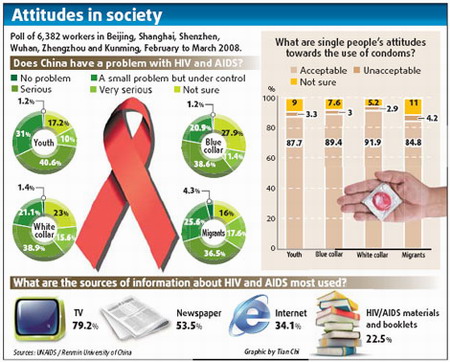
|
CHINA> Profiles
 |
|
AIDS outcasts left to suffer alone
By Wang Hongyi (China Daily)
Updated: 2009-07-01 09:47
 Discrimination presents a major obstacle to the implementation of effective HIV prevention and treatment across the globe, according to experts. "There is widespread association of HIV with improper and immoral behavior, partly because of the failure to educate Chinese citizens about AIDS in the 1980s and 1990s." said Lin Gu, veteran journalist for Xinhua News Agency. "This means people do not want to live or work with such a group of people." Li Jing, a Beijing-based UN volunteer who works on AIDS awareness, as well as counsels victims on how to live positively with HIV or AIDS, also explained that the stigma is not just limited to sufferers. "My family supports me in my work but my mother still never tells others I work with HIV and AIDS victims because her friends would no longer play mahjong with her," she said. Following China's first case of AIDS in Beijing in 1985, the nation has implemented numerous policies to stop discrimination and provide financial support to sufferers.
Those misconceptions are also putting more lives at risk, experts have warned, as people tend to "drop their guard" because they believe only homosexuals or those in the illegal sex trade can catch the virus. The fear of humiliation is the most common reason HIV patients give for not seeking help from insurance companies or local governments, causing them to forfeit the social services support available. Bernhard Schwartlander, China director for UNAIDS, said the virus could be brought under control with treatment, but most people refuse to come forward in case news of their illness becomes public. "People who feel marginalized will not come forward or dare to seek medical treatment and guidance, and by doing so further fuel the spread of HIV," he said. Control policies have continually been rolled out by the central government over the years, but they have had little impact on privacy protection. "I won't tell the authorities about my illness," insisted one AIDS victim in Shanghai. "If I do, all my neighbors will know. I would rather die than tell them!" A doctor surnamed Chen at the Beijing You'an Hospital, which treats several hundred HIV and AIDS sufferers a year, said few apply for financial support from their medical insurance for fear of being exposed. The Chinese seem conflicted on their view of privacy for patients: many agree it is a basic right but few would want to live near or work with someone who is HIV-positive. However, many experts see confidentiality as crucial to encouraging more people to take the test and make the most of the help on offer. China launched a series of ambitious programs to raise public awareness of AIDS in 2003. It included education campaigns, which warned on the danger of mother-to-child transmission, and outreach projects targeting high-risk groups. The Ministry of Education formulated its basic requirement on health education as early as 1990, stating sexual morality and self-discipline must be taught in schools to prevent the spread of sexually transmitted diseases (STDs). "It is unclear how much AIDS education local authorities are actually implementing," said Professor Xia Guomei, of the sociology institute at the Shanghai Academy of Social Sciences. "A lack of qualified teachers and appropriate teaching materials and methods, especially in rural areas, may be hindering educational efforts." A study conducted by Renmin University of China and UNAIDS last year showed China is clearly still in need of an effective model of AIDS education. In a poll of more than 6,000 people in six major cities, 48 percent said they believed they could be infected with HIV by a mosquito, while 18 percent said they thought they would be infected if someone with HIV sneezed or coughed on them. It also found that 32 percent felt HIV sufferers deserved their illness "because of their immoral behavior" and 30 percent wanted infected children to be taught at separate schools from healthy ones. Although only 8.9 percent of HIV victims in China contracted the virus through sexual activity, the number is growing rapidly, with unsafe sex accounting for 45.8 percent of the new cases last year, followed closely by intravenous drug use, Xinhua reported. The Shanghai Center for Disease Control and Prevention (CDC) launched a study into the sexual habits of gay men in 2005 to find trends in the infection rates of HIV and syphilis, another STD. It discovered the incidence of syphilis from 2005 to 2007 remained around 12 to 13 percent, while HIV increased every year: from 1.5 percent in 2005, to 4.1 percent in 2006 and 7.5 percent in 2007. Of the men who took part, 60 percent said they had more than one sexual partner. "The increase in HIV involving gay men is a challenge for almost all Asian countries," said Kang Laiyi, an AIDS expert at the CDC. "Society is becoming more tolerant of gays and bisexuals, and intervention and education for this group should be intensified." He said the CDC also has a 1,000-strong team working to educate drug users and prostitutes. Teaching safe sex and promoting the availability of condoms has proved very effective in combating the disease in countries such as Thailand. But despite free giveaways over the years, condom use in China remains low. Experts believe sex education among young adults may also be a problem, with large majorities still unaware of how to correctly use a condom. Meanwhile, China is being urged to copy the example set by other nations where the most effective responses to HIV have often been led by sufferers and their families. Xia Jing, a volunteer from the UN's Positive Talk project, which has trained 35 patients to participate in HIV awareness activities in schools, offices and hospitals, said: "There is an urgent need to reach the general public and humanize the face of the HIV epidemic, rather than just fight the virus itself."
|